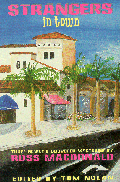|
|
DOUBLE SHOT: MICHAEL CARLSON AIMS BOTH BARRELS AT TWO MORE
COLLECTIONS FROM CRIPPEN & LANDRU |
STRANGERS IN TOWN by Ross Macdonald (edited by Tom Nolan)
paper $15.00
|
 |
KISSES OF DEATH by Max Allan Collins paper $17.00
|
 |
|
|
( available at specialist bookshops or via POBox 9315
Norfolk, Va 23505 USA or at www.crippenlandru.com) |
Ross Macdonald has become unfashionable
these days. His stories marked a transition point in the private
eye genre, between the classic days of the noir era and the
disruption to the world as we know it which we now remember as
the Sixties. Macdonald's Lew Archer was prescient in his
observations about Southern California and its people, and the
sense of flux out of control permeates the 'Harper' films Paul
Newman made as Archer. Two of these stories are early efforts. "Death
By Water" features an Archer -like Joe Rogers, who finds
himself involved in a murder while visiting a house-dick friend.
Rogers solves the crime, but the final twist comes in
unravelling its motive, whose altruism will be undone by
California law. It's a real forerunner to the sort of moral
tales which Archer would later guide us through, not least in
its references to buried family problems from the past.
"Strangers In Town" is another
tale where the secrets of the past reflect on the present,
featuring a rather subdued and somewhat wise-cracking Archer. "The
Angry Man" dates from later in Macdonald's career, and is a
fuller effort in all ways. It was later cannibalised into his
novel THE DOOMSTERS, and Macdonald himself marked this as the
point where Archer became more than just a guy solving crimes,
and became a fifure for understanding the mentality of the
criminals. This story has the fatalistic feel of Jim Thompson,
but Macdonald was always a more cerebral prose craftsman than
Thompson. As a link between the hothouse guignol of those
late-era pulps and the more analytical efforts of the 60s, this
takes some beating. There is also a long essay about Macdonald's
early career by Tom Nolan, which is disappointingly
unanalytical. The introductions to the stories do a better job
of placing them in the context of the Macdonald's career. He's a
writer who should always be in print. Max Collins, strangely
enough, has not been in print in the UK since his first Nate
Heller novel, TRUE DETECTIVE, almost twenty years ago. Since
then, ten more Heller novels have followed, as well as an
avalanche of other novels, movie novelisations, films, comics,
and even an excellent documentary on Mickey Spillane. But Heller
remains Collins' best work, a unique series of detective novels
which investigate the great unsolved (or mis-solved) crimes of
our century. Collins has achieved a consistency in the Heller
books, and a considerable depth of characterisation in a series
which could be dismissed as gimmicky. But far from it, as these
stories show well. The best of them are the biggest, where the
historical figures are given room to be characters. In "Kisses
Of Death" Heller is hired as bodyguard for Marilyn Monroe,
and solves the mysterious death of the fallen poet Max
Bodenheim. It's a great way to slip into the story, and it
works. The best of the bunch is "The Perfect Crime",
unravelling the death of actress Thelma Todd as a classic locked
room (or car) mystery. This story originally appeared, with
Philip Marlowe as the detective, in the 1988 anthology RAYMOND
CHANDLER'S PHILIP MARLOWE, but it plays better with Heller as
the sleuth. My personal favourite is "Strike Zone", in
which Heller is hired to protect Eddie Gaedel, the midget who
played one game for the St Louis Browns' baseball team when the
inimitable Bill Veeck owned the team. He later returns to
establish that Gaedel's death, years later, was not of natural
causes. The characterisation of Gaedel is priceless. Characters
like Elliot Ness and Frank Nitti appear in some of the other
stories, and there is a valuable checklist of Collins' myriad
books, as well as his own usual useful footnotes on historical
accuracy. I admit to being prejudiced in favour of Heller, but
I'd suggest this anthology as a starting point for anyone who
thinks that modern historical mystery could never get them
hooked.
 |
|
|
 SHOTS
ONLINE
SHOTS
ONLINE